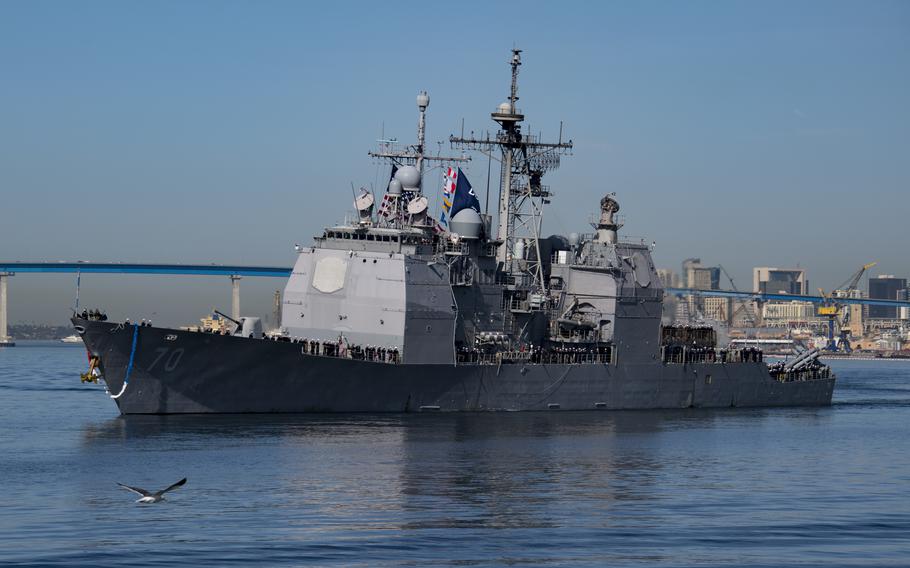
The Ticonderoga-class guided missile cruiser USS Lake Erie transits San Diego Bay. (Woody S. Paschall/U.S. Navy)
(Tribune News Service) — The United States is increasing its military presence in the southern Caribbean even more as part of President Donald Trump’s campaign to disrupt Latin American drug cartels, according to multiple U.S. officials familiar with the deployments.
Two sources briefed on the plan told the Reuters news agency that the guided-missile cruiser USS Lake Erie and the nuclear-powered fast attack submarine USS Newport News will arrive in Caribbean waters by early next week. The officials, who spoke on condition of anonymity because of the sensitivity of the operations, declined to detail the ships’ exact mission. But they described the buildup as aimed at countering threats to U.S. national security posed by groups that the Trump administration has formally designated as “narco-terrorist organizations.”
Another source familiar with the deployments confirmed on Monday to the Miami Herald that the Pentagon would add more ships to the deployment that began assembling in the region last week. That group includes the amphibious ships San Antonio, Iwo Jima and Fort Lauderdale, which officials said could be stationed off Venezuela’s northern coast. Together, the three ships are carrying about 4,500 personnel, including a Marine expeditionary unit of roughly 2,200 troops trained for rapid crisis response.
Those vessels are set to operate alongside three Arleigh Burke-class guided-missile destroyers — the Sampson, Jason Dunham and Gravely — which had been sent earlier to the Caribbean. The destroyers are built to counter simultaneous threats from air, land, sea and below the surface. Their vertical launch systems can fire Tomahawk cruise missiles for long-range strikes, standard missiles for air defense, and rocket-assisted torpedoes for anti-submarine warfare. By adding amphibious ships and Marines, the task force gains the capability to land forces ashore quickly if ordered.
The Pentagon has not publicly announced the deployments or their objectives. But senior administration officials have signaled they align with Trump’s broader pledge to use all elements of American power — from economic sanctions to military force — to stem the flow of narcotics into the United States and pursue those behind it.
“President Trump has been very clear and consistent: he’s prepared to use every element of American power to stop drugs from flooding into our country and to bring those responsible to justice,” White House press secretary Karoline Leavitt told reporters last week when asked whether the administration was considering ground operations inside Venezuela.
Cracking down on transnational cartels has become a defining theme of Trump’s domestic and foreign policy. Earlier this year, his administration formally designated Mexico’s Sinaloa Cartel, Venezuela’s Tren de Aragua gang, and several other networks as global terrorist organizations. That designation gives U.S. agencies expanded authority to freeze assets, disrupt financing and pursue cartel leadership with tools traditionally reserved for counterterrorism operations.
More recently, the administration labeled Venezuela’s so-called Cartel of the Suns — an alleged trafficking network run by President Nicolás Maduro and senior members of his military — as a “Specially Designated Global Terrorist” entity. U.S. prosecutors have indicted Maduro and several of his top aides, accusing them of turning Venezuela into a narco-state and conspiring to flood the United States with cocaine. The State Department has placed a $50 million bounty on Maduro’s capture, an unprecedented figure for a sitting head of state.
The Venezuelan strongman has rejected the U.S. accusations, calling them politically motivated and aimed at justifying regime change. In response to the naval buildup, Maduro announced that his government would activate a sweeping militia mobilization to “defend national sovereignty.”
“This week I’m launching a special plan to ensure coverage by more than 4.5 million prepared, activated, and armed militia members across the national territory,” Maduro declared earlier this month during a televised event, flanked by senior commanders. He denounced what he called “extravagant, bizarre, and outlandish threats” from Washington and vowed Venezuela would resist any foreign incursion.
©2025 Miami Herald.
Visit at miamiherald.com.
Distributed by Tribune Content Agency, LLC.